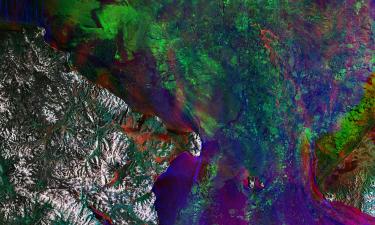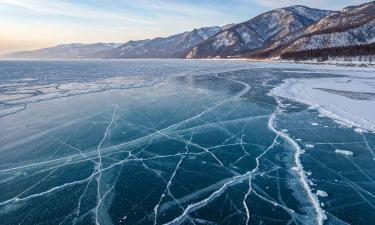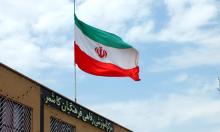Vladimir Putin Creating Anti-USA Axis?
Russia, China, and India – the anti-supremacy triangle?
A relevant result of Vladimir Putin’s five-day-visit to the East: the notion of a new “triangle” (Russia, China, and India) is being used everywhere in the world media. This was basically initiated by Indian journalists from the newspaper Hindu and from the Star-TV television channel. They interviewed Putin in Moscow two days before he left for his tour. They pointed out that Putin was coming to India after visiting China: “The trilateral cooperation between India, China, and Russia is developing rather quickly. In which way do you think this cooperation will continue? Will you bring a message to India from China?”
Putin’s answer was evasive. Yet, it became known later that the question from Indian journalists was not unfounded. The American newspaper Christian Science Monitor published an article entitled “Putin Pushes Strategic Triangle with China, India.” The story runs: "In Beijing, and in New Delhi yesterday, the Russian president put on what some analysts say is a clinic in selling the idea of a strategic partnership or "strategic triangle" in Asia between Russia, China, and India - with Moscow taking the lead.”
In this connection we would like to recollect Yevgeny Primakov’s visit to India four years ago (Primakov was the Russian Foreign Minister at that time). When Primakov arrived in India, he was informed about an American attack on Iraq. Then, Yevgeny Primakov said that the union of Russia, China, and India could be a viable opposition to American supremacy.
This is equal to absurdity, taking into consideration the traditional hostility between Delhi and Beijing. Yet, the fear of t unrestrained American aggression caused the reaction. The Hong Kong press wrote that the American brutality against Iraq and the USA-NATO aggression against Kosovo that followed the bombing of Iraq spurred Chinese President Jiang Zemin to talk to Chinese politicians. They allegedly recommended to pay more priority to the countries whose role in the NATO politics is insignificant. Then, they suggested the retrieval of relations with the third world. Finally, Chinese politicians recommended that Jiang Zemin to cooperate with Russia and India.
The victory of the America/NATO monster over Yugoslavia resulted in negative consequences for the United States on the international arena. Russia and China recollected the identity of their global interests. This eventually resulted in two important events that occurred during the year 2001. The Shanghai Five (the discussion club that makes up Russia, China, and three countries of Central Asia) turned into the Shanghai Cooperation Organization. This organization consists of six countries. In addition, Russia and China signed a treaty for neighborly relations, friendship, and cooperation in Moscow.
This was the result of attempts to restrain the American supremacy. Then, it was followed with a recession. After the terrorist attack on America on September 11th, Russia and China started competing for Bush’s sympathies. However, the experience of the first half of the year 2001 showed that Bush’s attitude regarding relations with Russia and China depends on the state of relations between Russia and China. The American president has shown that the USA was totally against a multi-polar world order. The USA aspires on for a New World Order, which causes many troubles in global political life. NATO expands eastwards, aggression against Iraq is being prepared in public, and separatists are supported everywhere, from Taiwan to Chechnya. Most likely, this is what has initiated the idea of creating a Eurasian triangle.
Western media are rather malevolent about this triangle. The documents that were signed in Beijing, Delhi, and Bishkek (Kyrgyzstan capital) regarding the advantages of the multi-polar world order and the necessity for a diplomatic solution concerning Iraq were extremely cautious in their wording.
Putin made it understood that he is interested in preserving a counterbalance, despite the USA’s policy of forcing the world to acknowledge that it is the only current superpower. Putin signed a declaration for the advantages of the multi-polar world order, which is completely opposed to the American New World Order.
The Moscow-Beijing-Delhi triangle plays an important role in business connected with the few competitive Russian exports. China and India are the main buyers of Russian weapons. Russia and India attach a lot of importance to bilateral relations with the USA. Nevertheless, Washington must now think over the fact that Russia, China, and India all stand for a multi-polar world.
This is another kind of triangle now, not like the one Yevgeny Primakov saw. There is no anti-American protest hidden there. This is what Dmitry Kosyrev, RIA Novosti observer, thinks. Putin’s tour of the East was preceded with the settlement of the conflict with Alexander Lukashenko. When the tour was over, Russia regrouped its Air Force unit in the republic of Kyrgyzstan. Was it all incidental?
Creating a multipolar world is like a road of a thousand miles. Any step on this road is a bliss. It seems that the result of Vladimir Putin’s trip was a few steps away from the New World Order and a few steps towards a multipolar world.
Andrey Krushinsky PRAVDA.Ru
Translated by Dmitry Sudakov
Subscribe to Pravda.Ru Telegram channel, Facebook, RSS!





